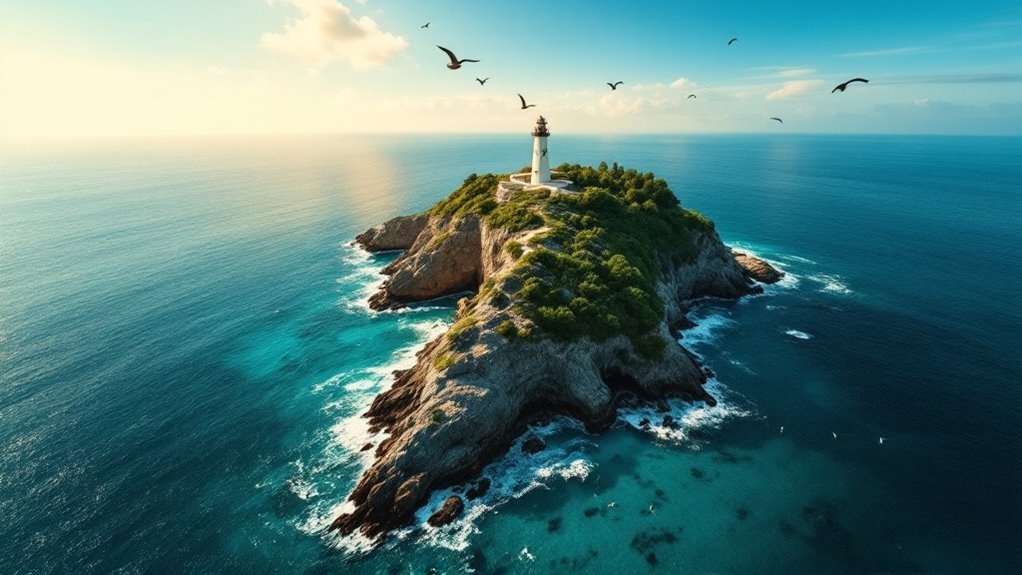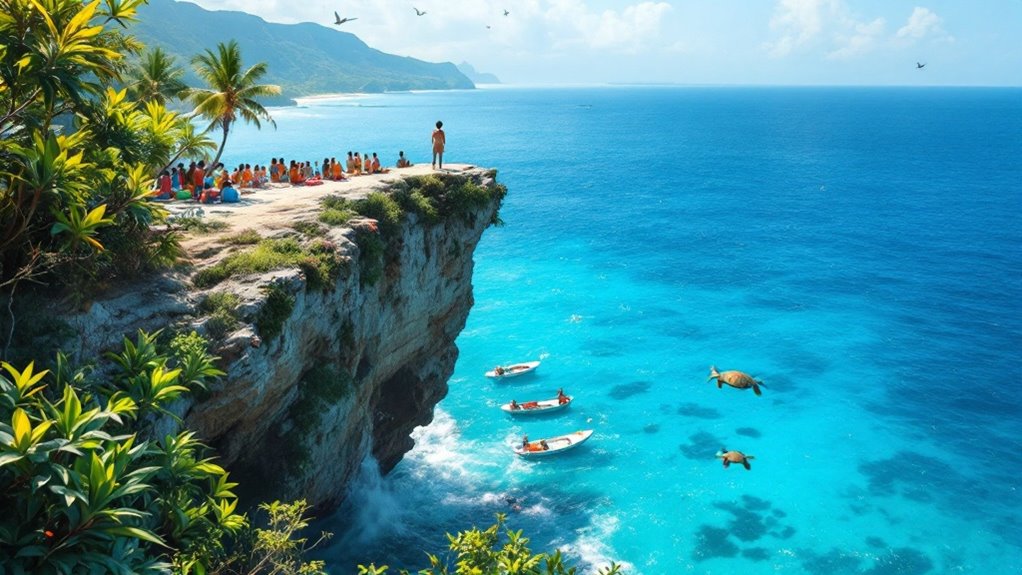You might not realize that remote islands, often seen as idyllic escapes, are also places of profound existential reflection. When you attempt to capture their isolation and beauty, you're not just describing landscapes; you're engaging with a deeper narrative of solitude and self-discovery. It's about more than just pristine beaches and lively reefs—it's about the interplay between land and human psyche. How does one translate the vast silence and untouched wilderness into words that resonate? There's an art to it, and exploring this art can transform your writing profoundly.
Setting the Scene
When you think of remote islands, geographical isolation might be the first thing that comes to mind. Picture standing on Tristan da Cunha, where you're over 2,000 km away from Saint Helena, or the Pitcairn Islands, equally distant from Easter Island. It's like being in a world where GPS just gives up. The isolation themes here are strong; access is limited to a handful of voyages each year to Tristan da Cunha, and reaching the Pitcairn Islands might involve more paperwork than a tax audit. Adding to the sense of isolation, Ittoqqortoormiit in Greenland is surrounded by the vast expanse of the Northeast Greenland National Park, one of the largest national parks in the world.
The landscape descriptions are equally fascinating. Tristan da Cunha boasts volcanic peaks and steep gullies, while the Kerguelen Islands provide a rugged backdrop with active glaciers. It's as if Mother Nature decided to show off her dramatic side. The volcanic origins of these islands add a touch of fiery history to their charm. Queen Mary's Peak on Tristan da Cunha and Desolation Island in the Kerguelen group are just waiting to be etched into your travel dreams.
Embracing Natural Beauty
Picture stepping onto a remote island, where every corner reveals a spectacle of nature's untouched beauty. Visualize the pristine beaches with soft coral sand, where the only footprints belong to curious sea birds. The coastlines are picturesque, offering perfect backdrops for your postcard-perfect photos. Venture inland, and you'll find dramatic mountainous interiors, like those on Rarotonga, draped in lush jungle vegetation. It's a scene that could make even the grumpiest landlubber crack a smile.
Now, gaze into the crystal-clear waters surrounding these islands. They're teeming with life, from lively coral reefs to schools of fish darting through the sea like underwater fireworks. You might spot a blue-footed booby strutting its stuff or a marine iguana sunbathing like it owns the place. These island ecosystems are a reflection of nature's creativity, each a natural wonder in its own right. Many of these islands are biodiversity hotspots, showcasing rare and unique species that have evolved in isolation, making them crucial for conservation efforts.
And let's not forget the unique flora and fauna. Picture seeing a dragon's blood tree on Socotra Island or the lively dance of albatrosses on the Kerguelen Islands. It's like stepping into a nature documentary—minus the dramatic voiceover. Embracing these wonders connects you to a world where nature still reigns supreme.
Psychological Effects of Solitude

While the natural beauty of remote islands captivates the senses, solitude on these isolated lands can profoundly affect mental health. Living in such seclusion may seem like a dream at first, but it can quickly turn into a mental health challenge. Prolonged isolation increases the risk of depression and anxiety, with a side order of emotional numbness that's as appealing as a soggy sandwich. You might find yourself battling heightened stress levels, struggling with sleep, and feeling like your energy tank is perpetually on empty. Additionally, humans are inherently social creatures, and isolation can lead to negative mental, emotional, and physical impacts over time.
It's not just about feeling a little off; your cognitive functions can take a hit too. Memory, attention, and problem-solving skills might start playing hide and seek, and nobody likes that game. Emotional resilience becomes vital when you're miles away from the nearest human interaction, as the feeling of being trapped can lead to a dreaded social detachment. You may dread social activities, yet paradoxically feel relief when plans are canceled.
The key is balancing the solitude with self-care strategies that bolster emotional resilience. Recognize the mental health challenges, and take proactive steps to maintain a sense of connection, even if it's just a chat with a tropical bird.
Adventure and Discovery
If your spirit craves adventure and discovery, remote islands offer the perfect escape into nature's raw beauty. Envision setting out on island exploration where each adventurous journey reveals untouched landscapes and hidden wonders. Take Pitcairn Island, for instance. A 32-hour boat ride away from French Polynesia leads you to its volcanic terrain, pristine snorkeling spots, and rugged cliffs. It's like stepping into a postcard, minus the crowds. Pitcairn Island is home to a population of about 50, who are descendants of the HMS Bounty mutineers.
For those with a thirst for scientific expeditions, the Kerguelen Islands beckon with towering volcanic peaks and glaciers. Accessible only by French research vessels, these islands are the ultimate destination for explorers seeking raw natural beauty. Meanwhile, South Georgia Island offers dramatic mountain peaks and icy fjords, perfect for hiking enthusiasts who enjoy a good challenge.
Then there's Bouvet Island, an expedition like no other. A glacier-covered paradise with an inactive volcano, it's home to unique wildlife like the macaroni and chinstrap penguins. The journey itself is an adventure, requiring a research vessel to travel over 2,600 km away from the nearest inhabited land. So, pack your adventurous spirit and get ready to explore these remote islands, where every discovery awaits.
Interacting With Locals and Wildlife

Exploring remote islands isn't just about breathtaking landscapes and adventurous journeys; it's also a unique opportunity to connect with both locals and wildlife. The cultural exchange here is unlike anywhere else, thanks to the islands' strong traditions. Locals may greet you wearing striking costumes or animal masks during local events. They might follow matriarchal systems, where women hold significant social power. Learning a few phrases in their unique language can open doors to deep conversations about their beliefs, like animism, and help you blend in. Nurse Eunice Da Silva and others like her can be invaluable, guiding you through community involvement and ensuring your presence is welcomed. While you're at it, don't forget the wildlife. These islands boast diverse ecosystems, from mangroves to coral reefs, teeming with life. You might spot endangered sea turtles or the elusive three-toed pygmy sloth. Participating in conservation efforts or simply snorkeling can support these fragile environments. Researchers from various institutions are actively working on disease elimination studies to improve the health of the island's inhabitants. Who knew that your vacation could help save a coral reef? Just remember, whether you're chatting over coffee or marveling at manatees, every interaction enriches your experience and theirs—it's a win-win for everyone!
Literary and Symbolic Insights
Remote islands hold a profound place in literature, serving as more than just geographical entities; they are symbolic landscapes that challenge characters to confront their innermost fears and desires. These islands, with their symbolic isolation, strip characters of societal norms, pushing them into existential journeys of self-discovery. Envision being on an island where conventional rules don't apply; it's both thrilling and terrifying. Characters, and you by extension, might find themselves redefined, embracing psychological transformation amidst the isolation.
Islands also dance between utopian themes and dystopian realities. They're depicted as paradises like Huxley's Pala, where science and spirituality coexist, or as chaotic domains, housing the unknown. It's a cultural crossroads, where differing identities and morals collide and merge. In literature, islands can be both safe havens and grounds for upheaval, sparking character transformation and internal conflict.
As you explore islands in your writings, consider their metaphorical significance. These miniature universes become mirrors reflecting broader societal questions. They intensify existential journeys, inviting you to ponder the limits of understanding and provoking epiphanies. Writing about islands isn't just about setting; it's about exploring the depths of human experience. The island setting serves as a boundary between known and unknown worlds, acting as a threshold for profound transformation and mystery.
Wrapping up
You've now charted a course through the mysteries of remote islands, where beauty and isolation dance a curious tango. Picture lush jungles whispering secrets, while solitary beaches echo your thoughts. While you pen these tales, remember that solitude can be as enlightening as it is confining, like a hermit crab with a too-tight shell. By weaving in local lore and wildlife encounters, you'll craft a narrative that's as enchanting as it is enlightening. Happy writing!